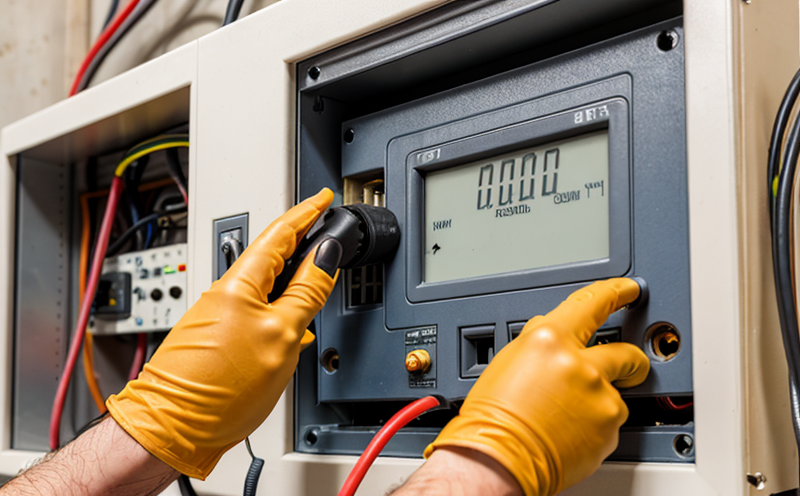IEC 63330 Functional Testing of Lithium-Ion Batteries for UAVs
The International Electrotechnical Commission (IEC) standard IEC 63330 provides a comprehensive framework for the functional testing of lithium-ion batteries used in unmanned aerial vehicles (UAVs), also known as drones. This stringent test ensures that batteries meet critical safety, performance, and durability requirements necessary for UAV operations.
During this process, we conduct rigorous tests to evaluate the electrical characteristics and operational behavior of lithium-ion cells under various conditions. The tests are designed to replicate real-world scenarios that these batteries might encounter during flight, including temperature variations, voltage stress, and current draw patterns.
The testing aims to identify potential weaknesses or failures in battery performance, ensuring that drones operate safely and reliably across a wide range of environmental conditions. This includes assessing the battery's ability to maintain stable voltage levels throughout its lifecycle, withstand overcharging and discharging events, and recover from thermal shocks without damage.
Our team uses cutting-edge equipment calibrated to international standards (IEC 63330) to perform these tests accurately and consistently. By adhering strictly to this protocol, we can provide detailed reports that serve as a benchmark for quality assurance and regulatory compliance.
The importance of such testing cannot be overstated in the UAV industry. A single compromised battery could lead to catastrophic failure during flight, endangering both people on the ground and those operating the drone. Our expertise lies in identifying these risks early through thorough functional tests, thus contributing significantly to enhanced safety standards within this rapidly growing sector.
For quality managers, compliance officers, R&D engineers, and procurement specialists involved in UAV development or operations, understanding the nuances of IEC 63330 is crucial. It enables them to make informed decisions about selecting appropriate batteries that meet not only regulatory requirements but also operational needs specific to their applications.
By choosing our service for IEC 63330 functional testing, customers gain access to state-of-the-art facilities and experienced professionals dedicated solely to delivering accurate results based on internationally recognized standards. This ensures peace of mind knowing that every battery undergoes meticulous evaluation before deployment into the field.
Scope and Methodology
| Test Parameters | Description |
|---|---|
| Voltage Monitoring | Continuous measurement of cell voltage during various stress conditions. |
| Cycling Tests | Simulating actual flight cycles to evaluate battery performance under realistic loads. |
| Overcharge and Overdischarge | Evaluating the battery's reaction when subjected to extreme charging rates beyond normal limits. |
| Thermal Cycling | Subjecting batteries to rapid temperature changes to assess their tolerance levels. |
| Test Criteria | Description |
|---|---|
| Voltage Stability | Battery should maintain nominal voltage within specified ranges despite varying current demands during flight. |
| Cycle Life | A minimum number of cycles must be achieved without compromising performance or safety features. |
| Overcharge Protection | The battery system must automatically shut down when reaching predefined upper voltage limits to prevent damage. |
| Overdischarge Recovery | Battery must recover fully after being discharged below its minimum safe operating point without permanent degradation. |
Why Choose This Test
The IEC 63330 functional testing is essential for ensuring the reliability and safety of lithium-ion batteries used in UAVs. Here are some key reasons why choosing this test is beneficial:
- Regulatory Compliance: Adhering to international standards guarantees that your product meets all necessary regulatory requirements, thereby reducing legal risks.
- Safety Assurance: By identifying potential issues early on through rigorous testing, you can ensure that batteries perform safely under various conditions.
- Informed Decision Making: Detailed reports provided post-testing offer valuable insights into the strengths and weaknesses of your battery design, aiding informed decision-making processes.
- Enhanced Reputation: Demonstrating adherence to strict standards enhances your company’s reputation among stakeholders and potential customers alike.
In summary, selecting IEC 63330 functional testing ensures that you are providing a safe, reliable product while also complying with industry best practices. This commitment to quality not only protects end-users but also sets a high standard for excellence within the UAV sector.
Customer Impact and Satisfaction
The impact of choosing IEC 63330 functional testing extends beyond mere compliance; it directly affects customer satisfaction by delivering safer, more reliable products. Below are several ways this service enhances the overall experience for our clients:
- Better Product Quality: Thoroughly tested batteries perform consistently across all expected environments and use cases.
- Increased Customer Trust: Meeting stringent international standards builds trust between manufacturers and consumers alike.
- Lower Warranty Claims: Reliable products result in fewer issues reported by users, leading to lower warranty claims and happier customers.
- Better Market Positioning: Demonstrating adherence to industry-leading practices helps companies differentiate themselves from competitors in the market.
In conclusion, investing in IEC 63330 functional testing not only meets regulatory obligations but also contributes significantly towards building a loyal customer base and maintaining a strong market position. It is an investment that pays off handsomely over time.





